Story
Staff Spotlight: Dr Frances Hopkins - Marine biogeochemist
13 May 2024
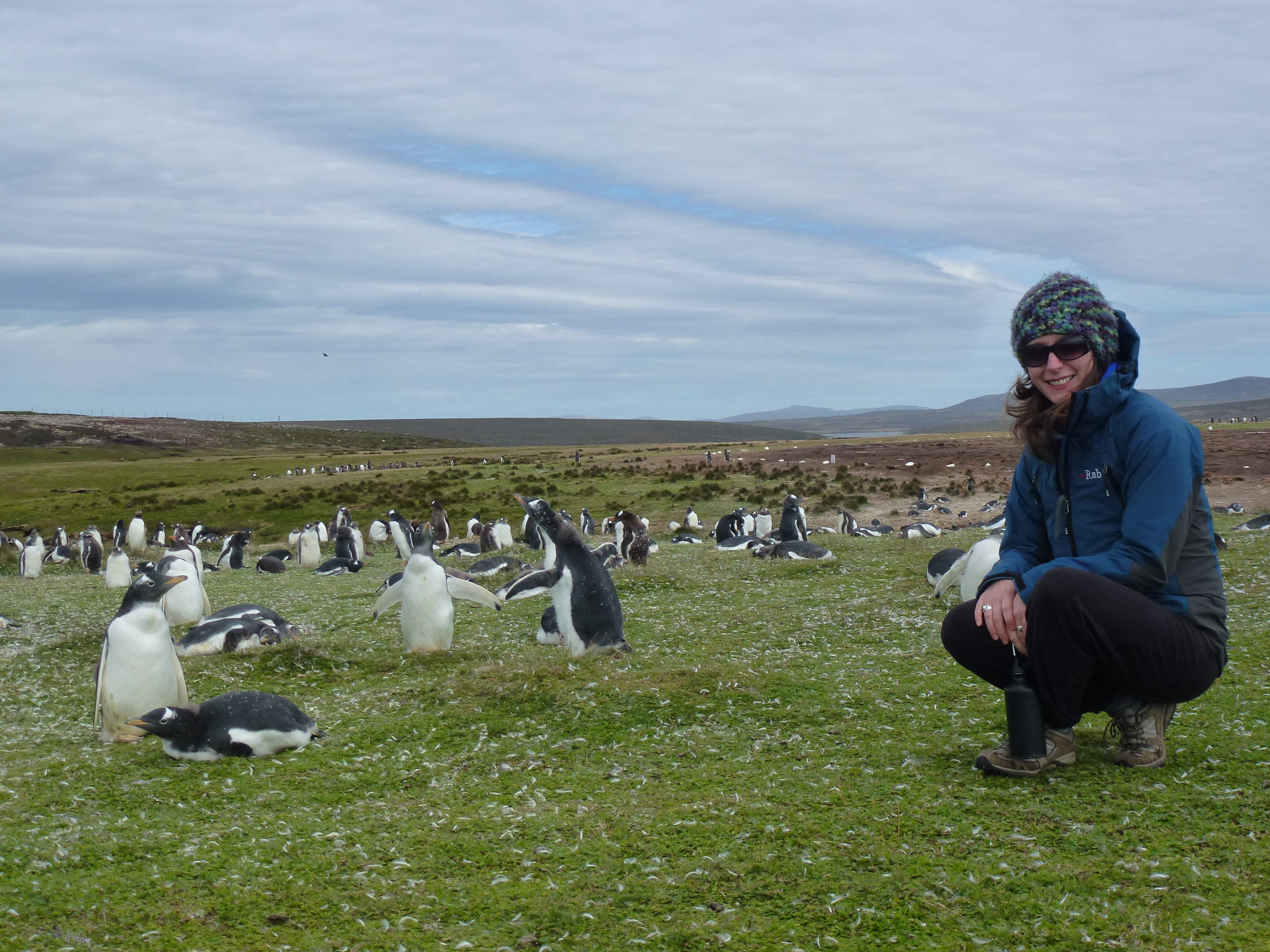
Above: Dr Frances Hopkins in the Falklands pictured alongside a large group of Gentoo penguins. Like other penguin species, gentoo penguins rely on the ocean for food and are never far from the water.
We first congratulated Frankie on her recent ‘work-iversary’, and then asked her what attracted her to PML, and what has kept her with us all this time.
“I was fortunate that PML co-hosted my PhD, so I spent a few months here working with my PML supervisor and the air-sea exchange team in 2007 – I was very impressed by the loveliness of South Devon, and just felt really at home both at PML and in this part of the country. So, when the perfect position opened at PML just as I was finishing my PhD, I didn’t hesitate to apply!”
“Fast forward 15 years, I’ve been involved in so many incredible projects over the years, travelled to beautiful and remote parts of the world, and enjoyed working with a brilliant team and developing my career at PML. And the southwest is just such a great place to live and raise a family. I couldn’t imagine myself anywhere else right now.”
Above: Frankie undertaking fieldwork in Svalbard as part of the European Project on Ocean Acidification (EPOCA)
Like Frankie, many of our PhD students go on to grow established careers at the laboratory, or develop close working relationships with the teams here that can last a lifetime of collaboration – building progressive scientific alliances between other organisations.
Frankie's PhD focused on investigating marine trace gases, including DMS (Dimethyl sulfide) – a naturally-occurring climate-cooling gas, and this has remained a focus for her during her career at PML. We next asked Frankie if she could tell us what inspired her to follow this area of research, and what has kept her following it all these years.
“I first learnt about DMS as an undergraduate at Bangor University – the fact that this microbial gas, which gives the sea its distinctive smell, could influence global-scale climate processes astonished me. This led me to apply for a PhD at the University of East Anglia (UEA) with Prof Peter Liss, which really was the place to be for DMS-related research at that time, so I was in very good company.”
“Even to this day, this area of research instils a sense of awe in me, and that has kept me going. I also feel I am contributing something useful to the bigger picture understanding of the Earth’s climate, and in the face of climate breakdown this helps me feel some sense of empowerment.”
Watch now: Dr Frances Hopkins explains what causes that distinctive smell of the sea: DMS (Dimethyl sulfide)
Understanding the processes that lead to the production of gases like DMS is critical to accurately predicting their flux to the atmosphere, and ultimately modelling the impact they have on Earth’s climate.
Frankie’s research has tackled diverse angles of this topic, including the influence of ocean acidification on marine trace gas production, the production of DMS by corals during air exposure, the influence of DMS on the palatability of microplastics to copepods, as well as studies directly focusing on the marine biogeochemical production and cycling of DMS. These studies are particularly useful for refining marine and Earth system models – helping scientists to understand how our climate may change in the future.
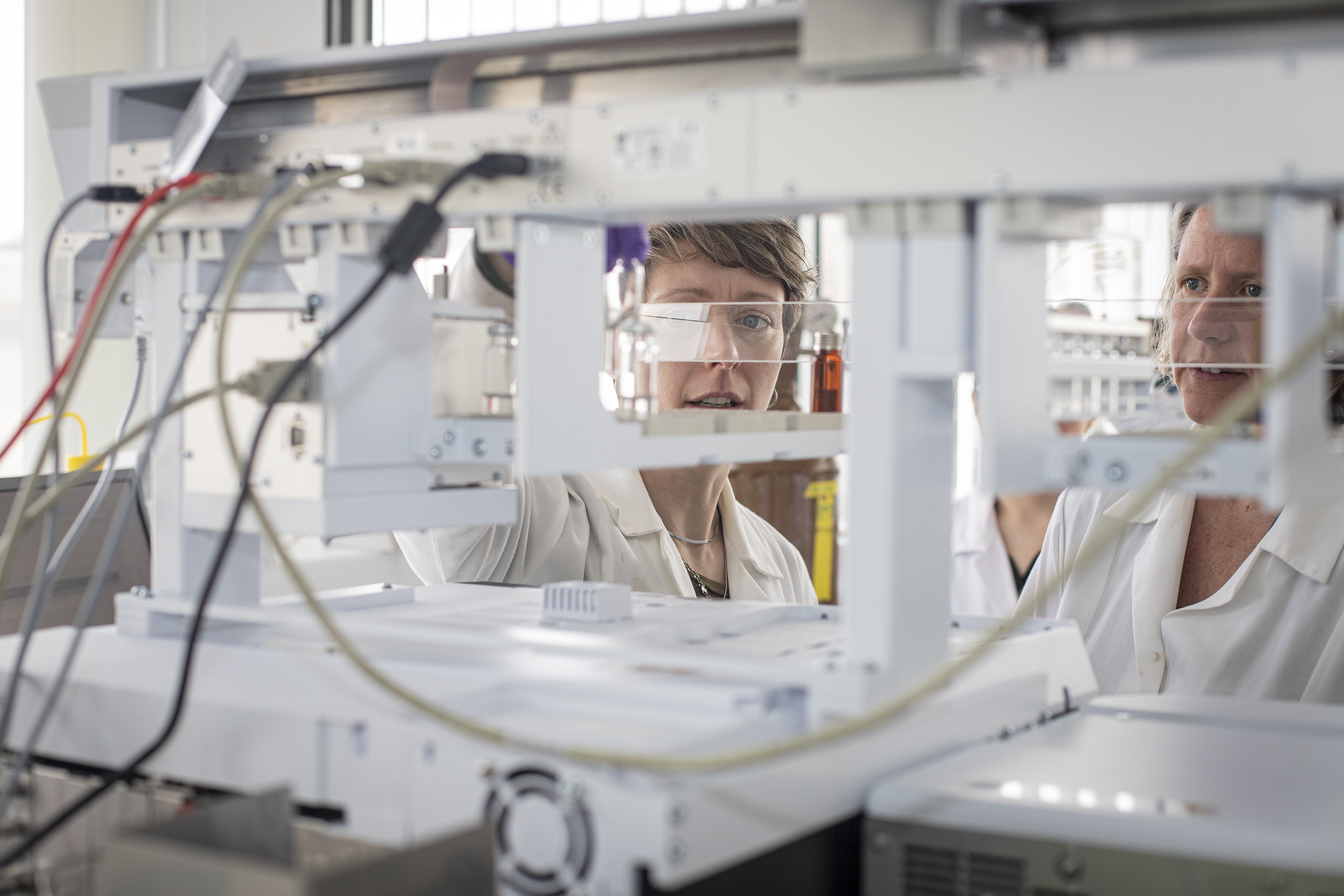
Above: Dr Frances Hopkins in the laboratory with Dr Ruth Airs, Marine Biogeochemist and Head of Postgraduate Studies
We next asked Frankie whether she could tell us about any of her recent projects on DMS, or DMSP (dimethylsulfoniopropionate), which, when degraded by microbes, is the main precursor of DMS.
“Our recent project looked at DMSP production in the English Channel in unprecedented detail, revealing that whilst on the whole phytoplankton such as dinoflagellates are key DMSP producers, the bacterioplankton species Synechococcus can make important contributions at certain times of year, expanding our understanding of the routes of DMSP production in the surface ocean.”
“This successful work was possible due to the excellent collaboration we have with Prof Jonathan Todd’s molecular genetics group at UEA, and the opportunity this gave us to combine our collective biogeochemical and molecular genetic forces. So, we now have a unique dataset for the Western English Channel which allows us to unravel the complex seasonality of DMSP production viewed through the lens of gene expression – watch this space for the papers to come!”
“We’ve also been working with Jonathan Todd’s team at UEA to investigate the production of DMSP and DMS from agricultural crops – in the context of both stress tolerance in crops in the face of climatic change (DMSP is a good stress reducing compound), and, to quantify the source of DMS from agricultural land – which represents a significant amount of land use. We made some initial measurements in a field of barley last summer, which we plan to repeat again this year.”
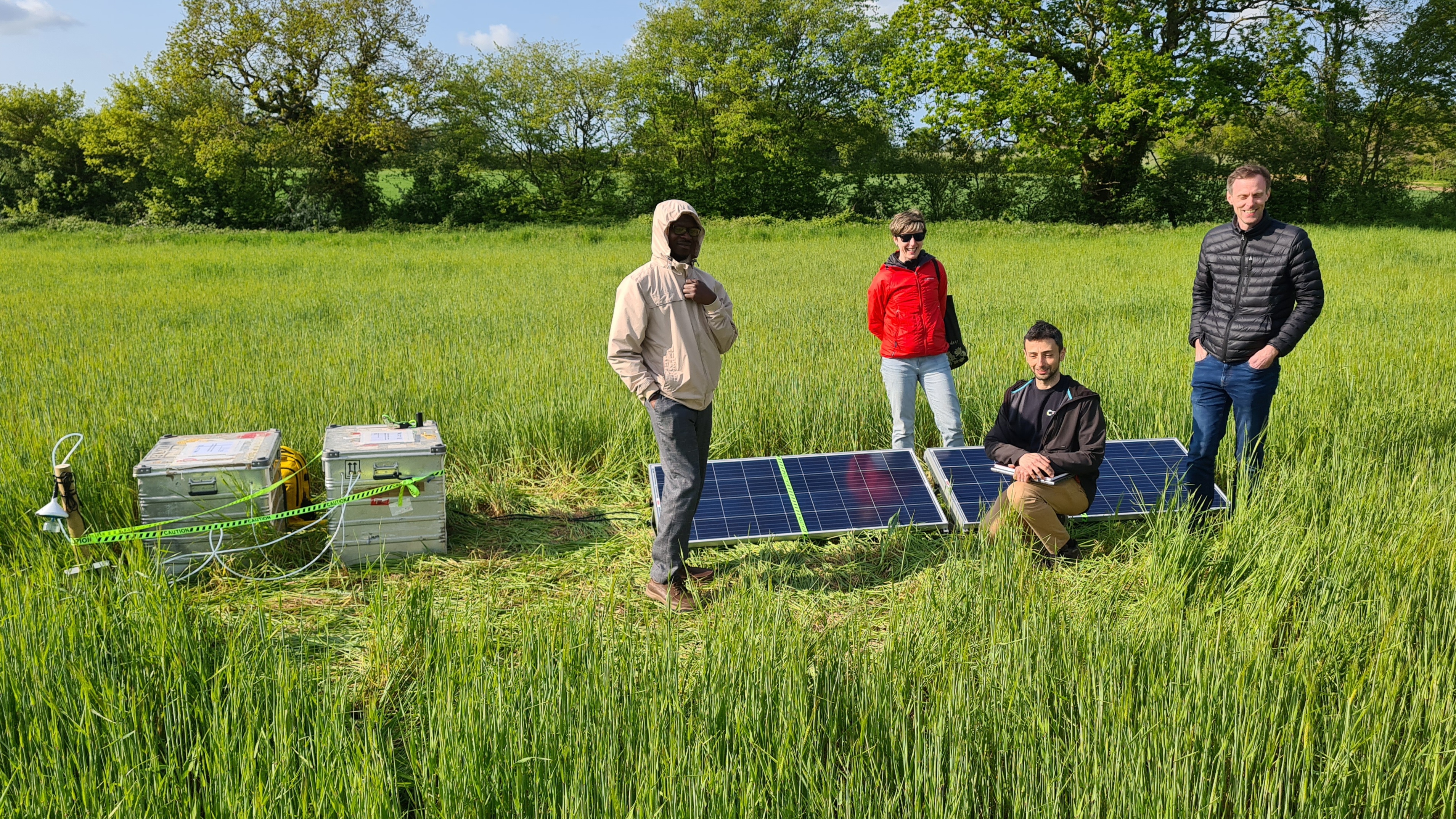
Above: Frankie and the team installing autonomous sensors into fields of crop to measure the production of DMS and DMSP in agriculture, for the project ’Earth's coolest organsulfur molecule: understanding how agriculture can be more cooling to the climate’.
We next asked Frankie if there were any other exciting projects she’s working on right now.
“We have two very exciting projects happening over the next few years – both of which involve multiple institutes with incredible collaborators from across the UK and beyond. The first project ‘CARES’ (Constraining the Role of Sulfur in the Earth System) aims to constrain the role that marine sulfur (from DMS and other volatile sulfur compounds) plays in controlling the Earth’s climate. We will be making key measurements from RRS Discovery next summer (2025) targeting blooms of coccolithophores (an important species of phytoplankton which produce lots of DMS) off the southwest coast of Ireland – at the same time the FAAM aircraft will be measuring what is going on in the atmosphere, from the sulfur oxidation chemistry, through to the formation of clouds. Climate modellers will then use this data to improve estimates of the influence of marine sulfur on climate.”
 Above: L4 Coccolithophore Coccolithus pelagicus. Credit Claire Widdicombe.
Above: L4 Coccolithophore Coccolithus pelagicus. Credit Claire Widdicombe. 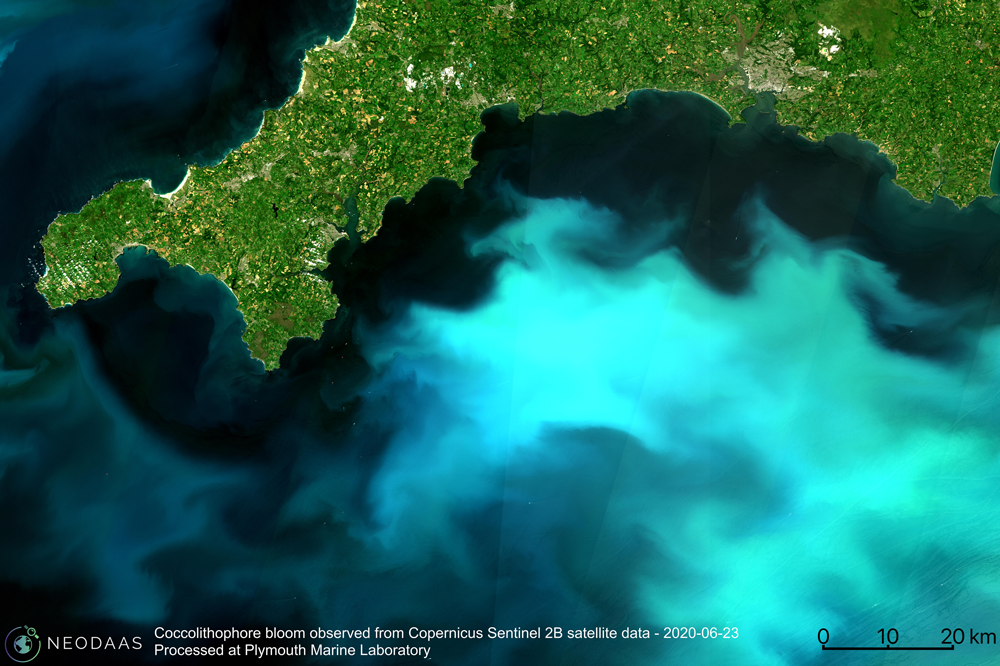
Above: A huge coccolithophore bloom in the Western English Channel, spotted from space by NEODAAS - based at PML.
“The second project ‘COCO-VOC’ (Closing the budget in marine atmospheric Oxidative Capacity through the quantification of Oceanic VOC emissions) aims to constrain the flux of volatile organic compounds (VOC) from the ocean to the atmosphere and determine the impact they have on the atmosphere’s oxidative capacity – this is essentially the ability of the atmosphere to ‘self-cleanse’ and impacts important processes like the atmospheric lifetime of the potent greenhouse gas methane. COCO-VOC is piggybacking on the CARES cruise – so some of us will have quite a lot of work on the ship next summer!”
“This will be followed by a research cruise to the Mauritanian upwelling, off the west coast of Africa, an area of incredibly high biological productivity and lots of VOC production – this provides us with a strongly contrasting site to the North Atlantic, so we can gain a better understanding of regional variability.”
We next asked Frankie if there had been any particularly special moments or highlights from her time at PML that she could tell us about.
“One of the great privileges of being a marine scientist is the opportunity to do science at sea. A particular highlight for me were three expeditions that I participated in as part of the UK Ocean Acidification research program. The first was a circumnavigation of the British Isles – a truly wonderful way to appreciate our islands! The second took us up into the Arctic Ocean – sea ice, polar bears and humpback whales were a nice distraction from the intense science activities. And finally, we headed to the Southern Ocean, following in the tracks of Ernest Shackleton, taking in the Falklands, Elephant Island, South Georgia (and a visit to the resting place of the great man himself), and the South Sandwich Islands, with wonderful albatross, penguins and whales joining us along the way."
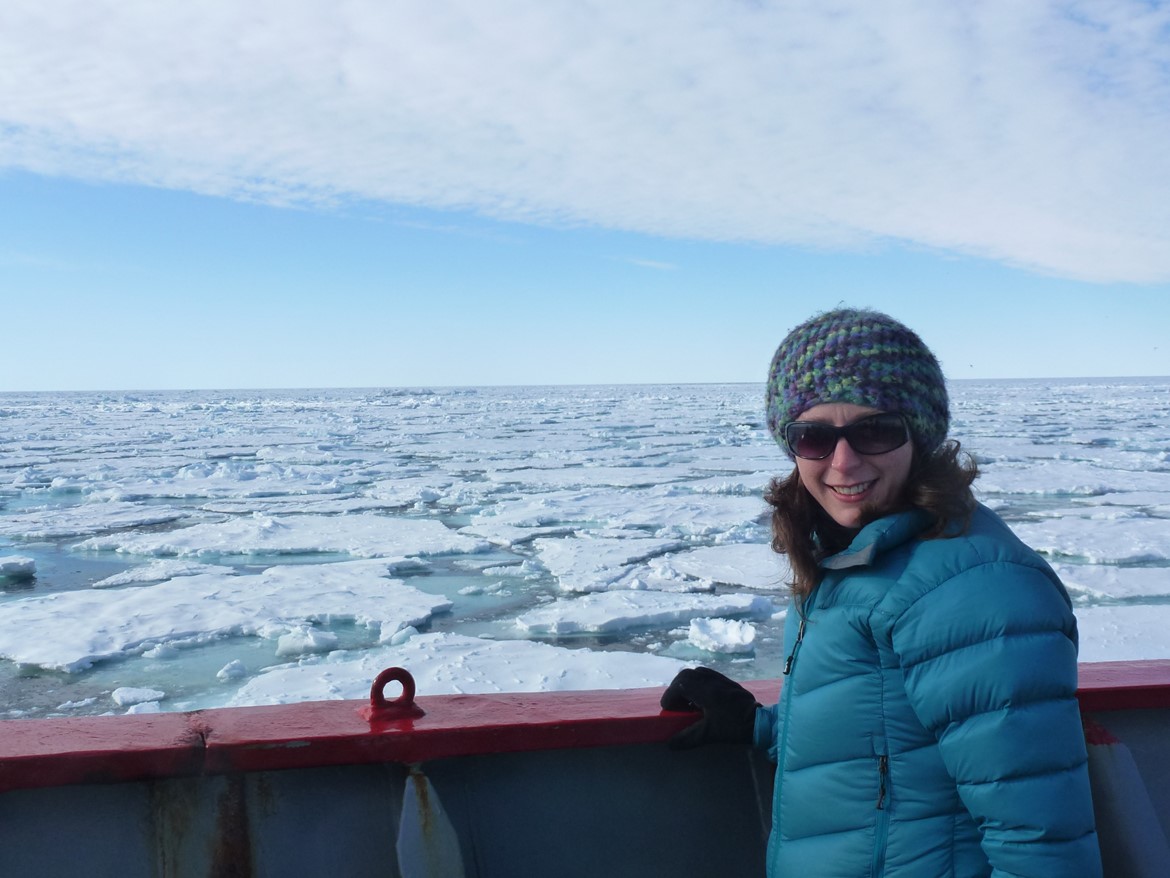 Above: Frankie aboard the RRS James Clark Ross in the Arctic Ocean as part of the UK Ocean Acidification Research Programme.
Above: Frankie aboard the RRS James Clark Ross in the Arctic Ocean as part of the UK Ocean Acidification Research Programme.
Above: Frankie undertaking fieldwork in Svalbard as part of the European Project on Ocean Acidification (EPOCA)
On top of the day job, Frankie is also a member of the ‘Equality, Diversity and Inclusion’ committee, and was also instrumental in securing our ATHENA SWAN certification. She is also on the Environmental committee and is currently co-supervising two PhD students.
Above: Frankie pictured with MRes student Yinghao Chen at the laboratory
We asked Frankie if she could tell us a little more about what drives her to support these areas of work at the laboratory, and how she manages juggling so many different plates.
“I’m passionate about making PML a welcoming and great place to work, and this is what drives me to get involved with these committees. I first engaged with Athena SWAN and PML's gender equity initiatives not long after returning from maternity leave after the birth of my eldest son – it all resonated quite deeply with me, as I began to become aware of the challenges and potential barriers faced by working mothers.”
“At that time, PML still had some work to do in terms of supporting the career development of underrepresented groups, and whilst we have made excellent progress in recent years, we can always do better. The EDI committee is devoted to ensuring everyone feels welcome at PML, and everyone is given the opportunity to flourish, and it’s great to feel I can have some influence over how we go about this.”
“I also love being involved with the environmental committee – I'm a passionate environmentalist and nature-lover, and it’s great to have these discussions within the context of PML. And not only is supervising PhD students a pleasure and something I learn so much from – it is vital to ensure a succession of excellent scientists to help us tackle the big problems we face going into the future.
So, all this does keep me very busy, and I am not immune to burnout – it's important to be able to be aware of your limits (which I am still learning!), set boundaries and say ‘no’ and step away when you need to.”
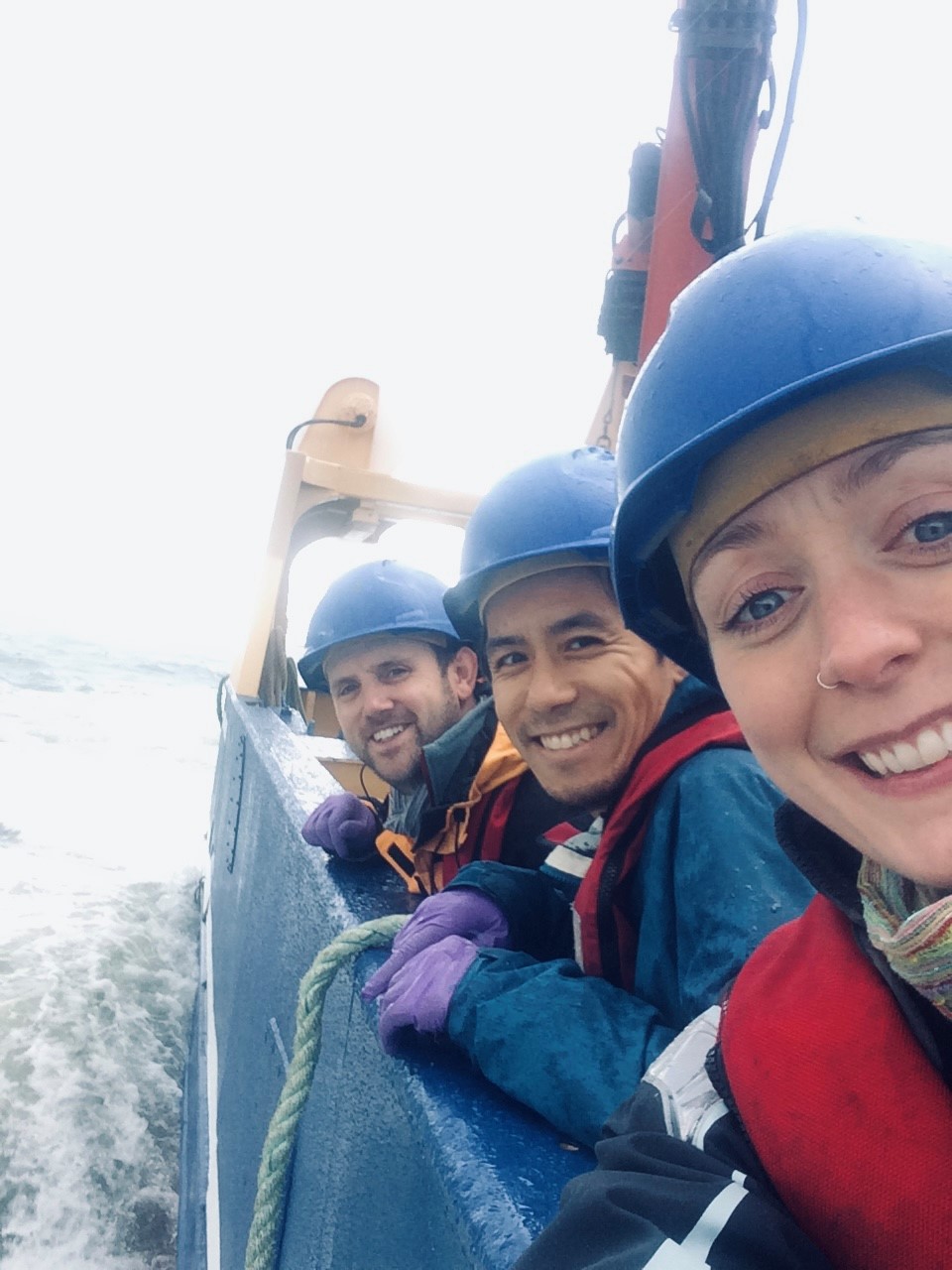 Above: (from left to right) Prof Tom Bell, Dr Ming-Xi Yang and Dr Frances Hopkins undertaking fieldwork on PML’s research vessel, the Quest
Above: (from left to right) Prof Tom Bell, Dr Ming-Xi Yang and Dr Frances Hopkins undertaking fieldwork on PML’s research vessel, the Quest
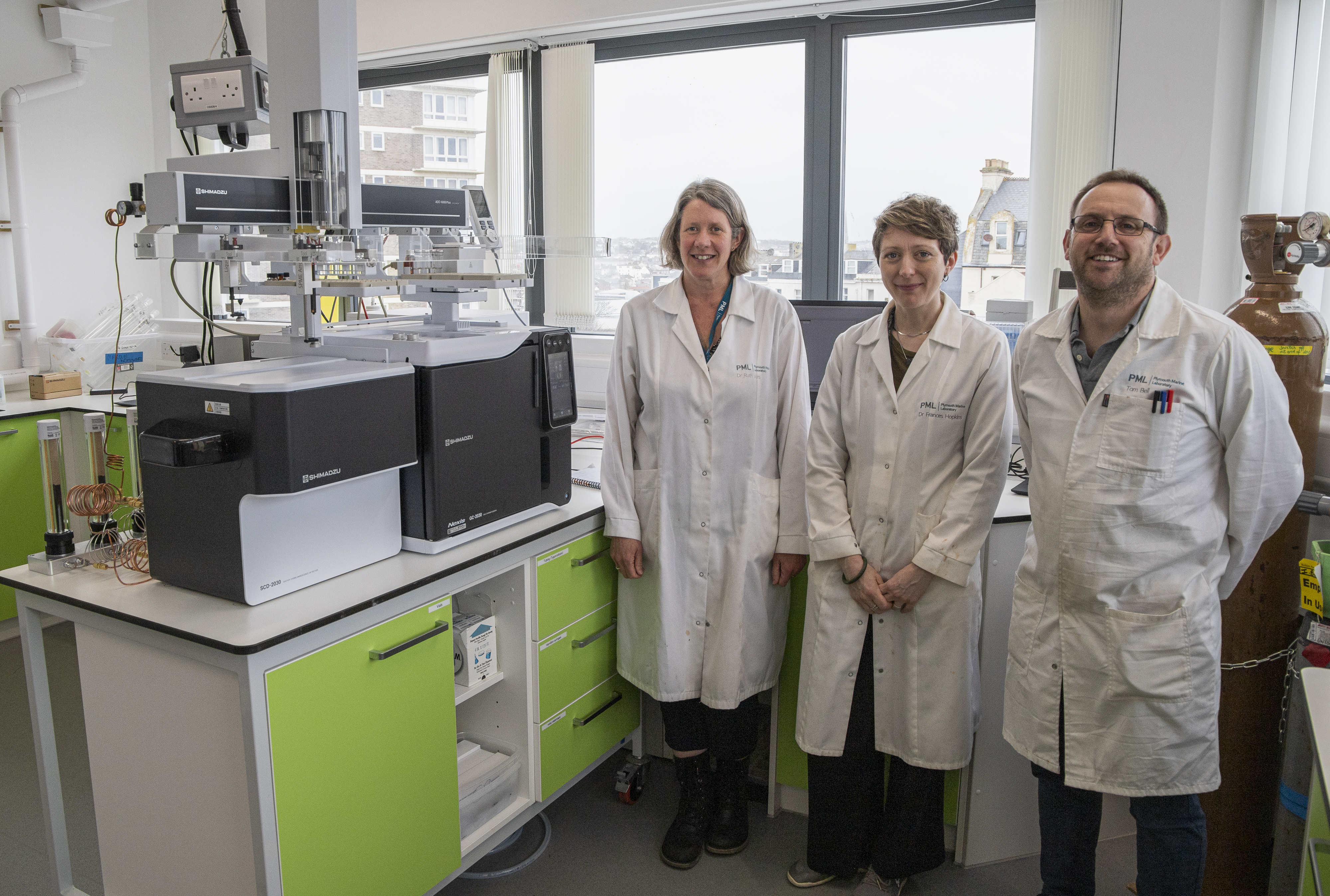 Above: (from left to right) Dr Ruth Airs, Dr Frances Hopkins and Prof Tom Bell in the laboratory
Above: (from left to right) Dr Ruth Airs, Dr Frances Hopkins and Prof Tom Bell in the laboratory
Our last couple of questions for Frankie were based around getting to know her more personally, away from the science. We asked her if she could tell us about any hobbies or interests, or what she likes to do after a day at the laboratory.
“I do keep myself very busy – I have two young boys, so life is very full on with not much time for unwinding (!), but I know how important it is to do the things that give you joy. I love yoga, running, swimming in cold and warm water, family bike rides and long walks on the moor. I get a lot of pleasure from my garden - we’re lucky to have a good-sized space and I spend a lot of time making it as wildlife-friendly as possible. It’s full of birds and bees and other beasties which makes me very happy!"
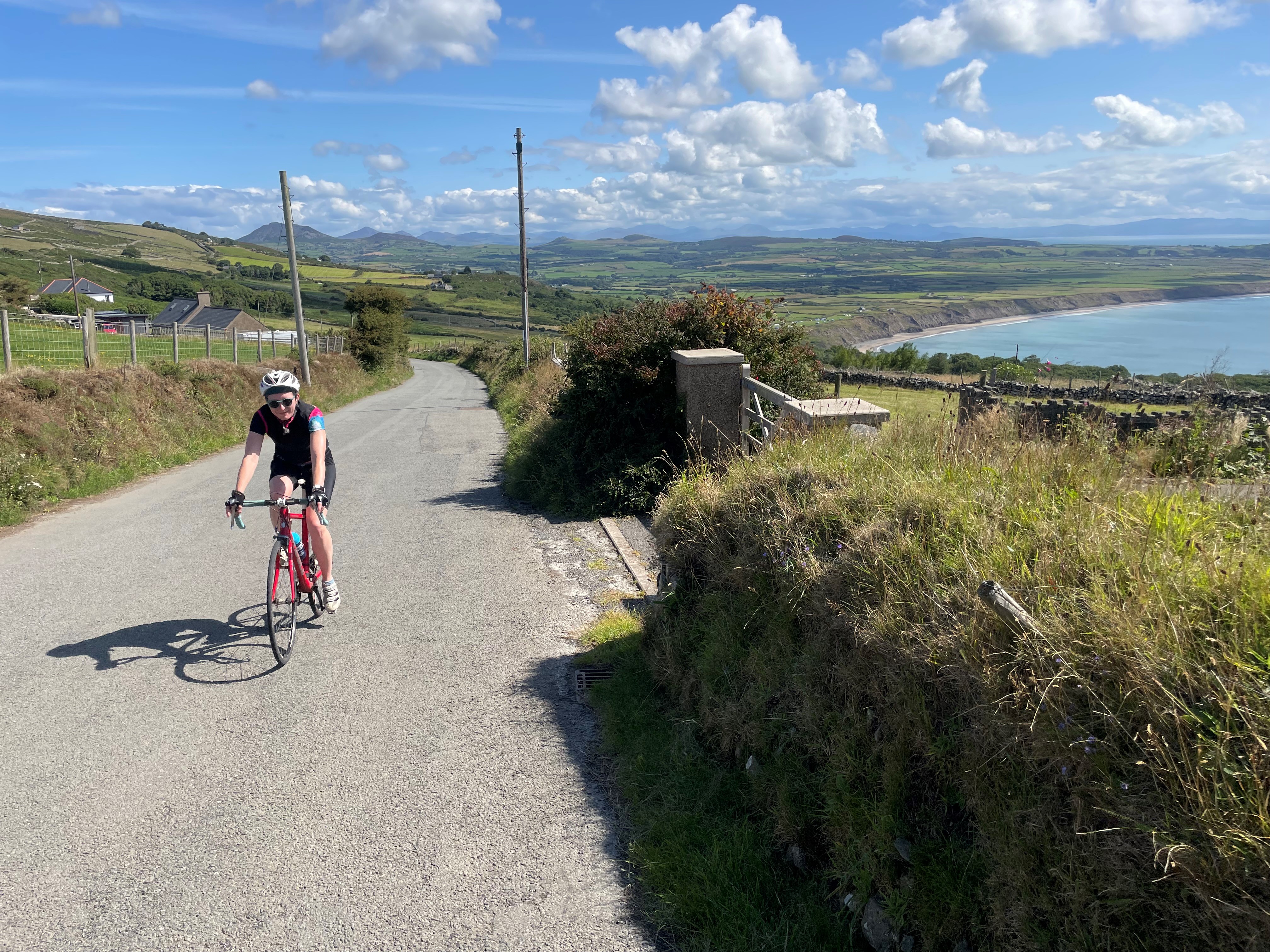
Above: Frankie enjoying the sunshine on a bike ride in North Wales
“I also love nurturing houseplants - my house and office at PML are full of them! I somehow also manage to squeeze in volunteering as a leader at our local Beavers group and getting involved in community sustainability activities in my village.”
Our last question for Frankie was to ask what she enjoys about working and living in Plymouth.
“I couldn’t imagine living anywhere else in the UK – I’m an outdoor lover, and the natural environment surrounding Plymouth is incredible. The beaches of South Devon near where I live are some of the best in the country, and Dartmoor is a pretty special place, full of unspoilt nature. It does rain a lot here – but I’m happy living in a lush green and wet environment, without which we wouldn’t have our amazing temperate rainforests. And when the sun does shine, you’d be hard pushed to find bluer skies!”
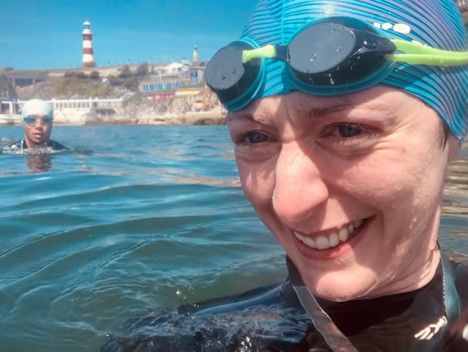
Above: Frankie on a sunny lunchtime swim in Plymouth Sound, with Dr Ming-Xi Yang following behind.
Related information
-
Measuring manmade and natural gases in the sea air: Our Dr Frances Hopkins talks about how the Marine Biogeochemistry team measure various gases produced both by human activities and naturally by the ocean: from Carbon Dioxide and Methane, to climate-cooling gases like Dimethyl sulfide.
-
Discover our new project investigating the production of climate-cooling gas DMS in agriculture: Scientists have installed autonomous sensors into fields of key crops to gain a better understanding of how agricultural land may act as a source of dimethylsulfide (DMS).
-
The cool twin of carbon dioxide gets some worthy attention: A new evidence review draws attention to the often overlooked marine trace gas dimethylsulfide (DMS). The review covers its production and fate, its importance for climate cooling and identifies the key knowledge gaps.